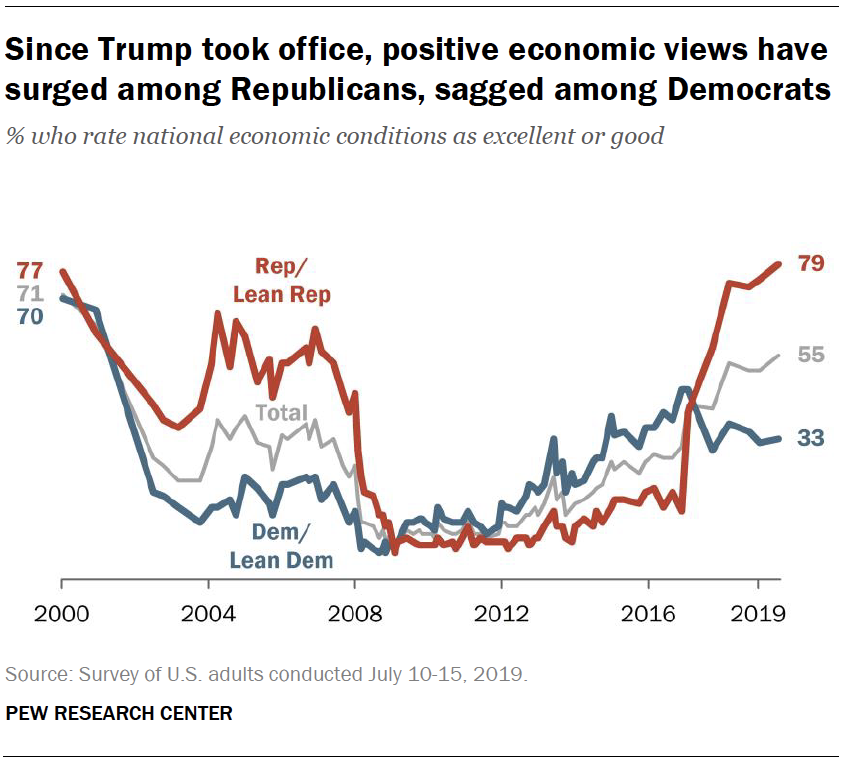Trump's Economy: Americans' Views & Latest Polls
Is the American Dream still alive, or has it been eroded by economic anxieties? Recent polls paint a stark picture of waning confidence in the economic policies of former President Donald Trump, revealing deep divisions and shifting perspectives on the nation's financial health.
The data, compiled from various surveys, reveals a complex interplay of factors influencing public opinion. While its important to acknowledge that any snapshot of public opinion is by its nature subject to change, the consistent negative trendlines are hard to ignore. For instance, in the latest figures, a mere 39% of adults approve of Trumps handling of his former role, a noticeable drop from the 45% recorded just two months prior. This decline comes amidst mounting concerns over the economy, immigration, and the expansion of presidential power. The economic concerns, in particular, seem to be a major source of discontent, as a majority of Americans express worries about several economic issues plaguing the country.
Before we delve further into the intricacies of this data, let us take a quick look at the survey's reference:
| Aspect | Details |
|---|---|
| Poll Source | Various Surveys and Polls |
| Data Collection Period | Recent months, data ongoing |
| Target Audience | Adults in the United States |
| Authentic Website for Reference | Brookings Institution |
For years, even amidst considerable controversy, Donald Trump often received the benefit of the doubt when it came to economic management. However, this perception seems to be shifting. A majority of Americans now disapprove of his handling of the economy, with particular criticism directed at his trade policies, according to polls released on Wednesday. This shift is notable, as economic issues have consistently been a key concern for voters.
The change in sentiment is also apparent in the partisan divide. While Republicans views on the economy have improved since the fall, the opposite is true for Democrats. This divergence reflects the highly polarized political climate, where economic perceptions are increasingly colored by partisan affiliation. The data indicates that Republicans are less likely to approve of Trumps approach to trade and the economy than they are on immigration, and this is an additional sign that some of his supporters might not be entirely pleased with his performance.
Furthermore, the impact of Trumps economic policies is being felt by many. Half of Americans believe these policies have negatively impacted the economy, and a significant majority across all political affiliations are witnessing rising costs. Two in three Americans (67%), including 82% of Democrats, 65% of Independents, and 51% of Republicans, report that their costs are going up. This widespread sense of economic strain is contributing to declining confidence in Trumps economic leadership.
The drop in confidence is stark when compared to earlier periods. In January, Americans were largely optimistic about U.S. economic conditions, with few citing the economy as the nations top problem, and a solid majority approved of Trumps handling of the economy. However, today, views have turned negative. The economy is more frequently named as the top problem, and his job approval rating on economic issues has fallen. Only a quarter rate economic conditions as excellent or good, while 37% say they are only fair, and 38% rate conditions as poor.
The economic landscape is fluid. The data indicates that these views have fluctuated only modestly in the past year. In May, for instance, 23% expressed positive views of the economy. It is important to contextualize these figures within the broader economic environment, including factors such as inflation, interest rates, and global economic trends.
The shift in perception is also evident in how different demographics view Trumps economic policies. Republicans earning $75,000 per year or more are substantially more likely than those making less than $30,000 to believe that Trumps policies have improved the economy (88% vs. a lower percentage). In contrast, Democrats views do not differ much across income categories. This divergence highlights how economic success can be subjectively assessed, depending on individual circumstances.
Overall, the data paints a complicated picture. While some Republicans maintain a positive view of Trumps economic performance, the overall trend indicates a decline in confidence and a growing sense of economic unease. This shift underscores the importance of continuous evaluation, adaptation, and understanding of the complex economic challenges facing the United States.
Moreover, it is worth noting that these economic concerns are often intertwined with other issues. The survey reveals that Trumps approval on economic issues is much lower than it is on immigration, which suggests that the publics assessment of his performance is multi-faceted. The public also gives Trump low marks for his efforts to reach out to those who supported Kamala Harris in the presidential contest, which underscores the need for political leaders to unify diverse perspectives.
Looking ahead, the expectations of Americans regarding the economy in 2025 vary. While 40% of Americans expect economic conditions to improve in 2025, a significant portion holds a more pessimistic view. The economist and YouGov have surveyed Americans for years about their views on Donald Trump. Here are the most recent survey results and how opinion has changed. The economic health of the nation remains a paramount issue, and the future trajectory of these views will shape the political landscape. The economic outlook is a dynamic subject, and ongoing analysis is essential to capture the evolving views of Americans on Trumps economy.



Detail Author:
- Name : Dr. Hayden Corkery
- Email : kbuckridge@gmail.com
- Birthdate : 1999-05-03
- Address : 7596 Hills Drive New Dudleytown, WV 38628-2414
- Phone : 1-804-387-6961
- Company : Doyle and Sons
- Job : Word Processors and Typist
- Bio : Molestiae ipsa dolorem deserunt qui doloribus incidunt ex qui. Quia et aut nemo aut qui omnis. Nemo voluptatum omnis officiis accusamus et similique ea.